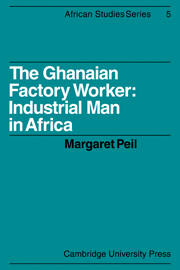Summary
In 1957, Ghana became the first sub–Saharan African nation to obtain her independence from colonial rule. She has long been known as the world's foremost producer of cocoa and exports sizeable quantities of gold, timber, manganese and industrial diamonds, but, like most new nations, she aspires to industrialize her economy. Although the country is small by world standards, its eight million people can support moderately sized industries producing relatively inexpensive consumer goods. These provide employment for a gradually increasing number of workers, mostly in urban areas. Per capita income was £85 in 1961, which is high for tropical Africa. Ghana is second only to Ivory Coast among the countries in West Africa in the proportion of the population engaged in wage labour (about thirty-five per thousand).
According to the 1960 Population Census, there were over 2.5 million persons aged fifteen or above in the labour force. Of these, 62% were in agriculture, fishing or lumbering, 14% in commerce, and 6% in services. Only 9% of the working population (233,947 people) were engaged in manufacturing. The majority of these are self-employed, small-scale craftsmen (and women) who provide for local needs as carpenters, tailors, fitters etc. Many are part-time farmers, practicing their trade in the dry season or whenever there is a demand for their services. Participation in manufacturing in the conventional sense is limited to less than a quarter of the total.
Information
- Type
- Chapter
- Information
- The Ghanaian Factory WorkerIndustrial Man in Africa, pp. 1 - 22Publisher: Cambridge University PressPrint publication year: 1972
Accessibility standard: Unknown
Why this information is here
This section outlines the accessibility features of this content - including support for screen readers, full keyboard navigation and high-contrast display options. This may not be relevant for you.Accessibility Information
- 2
- Cited by
